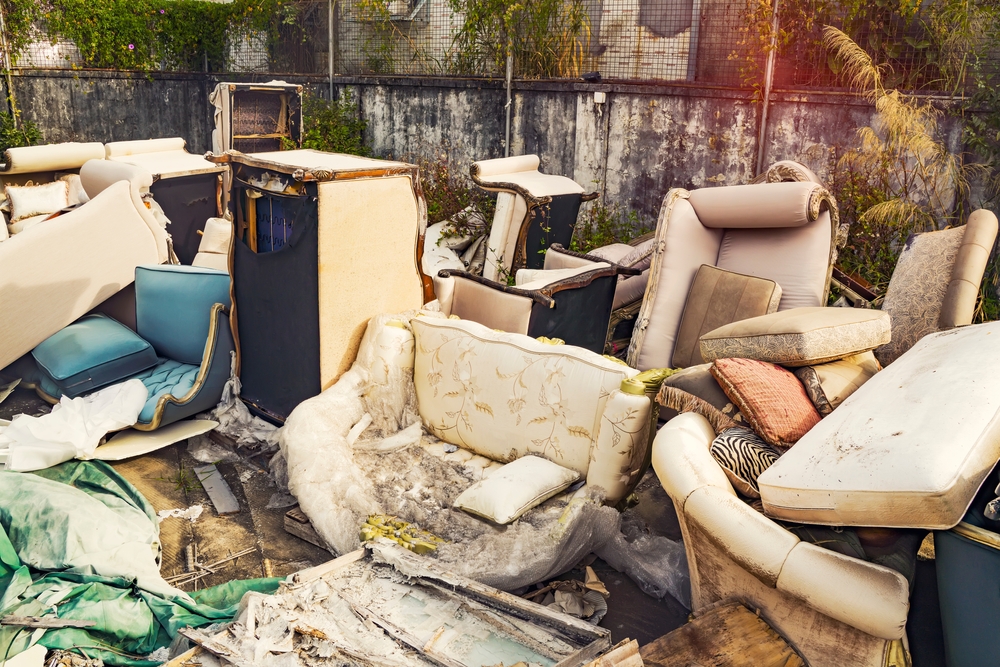Whilst SEPA said it is necessary to comply with the landfill ban without delay, it will not take any enforcement action in respect of any failure to do so before 31 January 2024.
This position only applies to POPs WUDS produced and originating in Scotland.
The guidance is set to be publicly published later today but has been given to letsrecycle.com.
It follows a study commissioned by the Environment Agency, which highlighted that the average concentration of Brominated Flame Retardants, and other POPs, found in items of upholstered domestic seating can be four times higher than the legal concentration limit – or threshold limit – of 1000 mg/kg.
This means that on becoming waste, these items of upholstered domestic seating are covered by existing legislative requirements specific to wastes containing POPs, which means they must be incinerated.
The landfilling of these items was banned in England from 2022, which more formal audits and enforcement beginning in August this year.
If you are unsure or unable to confirm the presence of POPs in the WUDS a precautionary approach must be adopted
- SEPA
Guidance
The guidance set to be published later outlines that WUDS such as sofas, sofa beds and any part of seating made of or containing leather, synthetic leather, other fabric, or foam cannot be landfilled.
This includes:
- Segregated items of WUDS
- Mixed waste containing items of WUDS
- Shredded or broken up waste arising from the treatment of waste containing items of
WUDS (including refuse-derived fuel and solid recovered fuel SRF) - Trommel fines from processes treating waste containing items of WUDS, including the
dust from air filtration systems
Items must not be sent to landfill unless it can be proved they do not contain POPs through X -Ray Fluorescence scanners or laboratory analysis to assess the POPs content.
“If you are unsure or unable to confirm the presence of POPs in the WUDS a precautionary approach must be adopted, and you should assume that the waste contains POPs and the relevant associated hazardous chemicals and manage the waste accordingly,” SEPA noted.
Warning
While enforcement will not begin until January 2024, SEPA has warned that cross-border movements of POPs WUDS to circumvent landfill bans already in place in other parts of the UK “will not be tolerated and SEPA will take appropriate enforcement action”.
Producers and holders of waste are required to undertake all reasonable efforts to avoid, where feasible, contamination of non-POPs waste with POPs waste. Failure to do so is an offence, the guidance adds.
Where mixing occurs, the whole load of ‘mixed waste’ should be considered as being POPs contaminated waste. If the POPs WUDS cannot be removed, the ‘mixed waste’ should be deemed a POPs waste and sent for destruction even if the mixing has diluted the POPs content to below the concentration limit.
Where separate collection is not feasible, POPs WUDS can be collected in the same vehicle as
other waste items as long as they:
- Are not damaged
- Are not mixed with other waste
- Are segregated from other waste during transfer and when unloaded
To prevent escape during transport, vehicles or containers used during the transportation of whole WUDS or shredded WUDs and/or fines should be appropriate for the waste type, be suitable for holding the waste, not overloaded and where appropriate covered.

As they rely on compaction, it is recommended that refuse collection vehicles are not used for the collection of POPs WUDs and collection in vans, lorries and caged vehicles is preferable to RCVs because the WUDS are not compacted and damaged in these types of vehicle.
Treatment
Operators have expressed an interest in shredding POPs WUDS before destruction by incineration, SEPA outlined. However the regulator said this requires an authorisation.
If shredding POPs WUDS you should meet the following criteria:
- Shredding plant should be located on an impermeable surface inside a building or under cover
- Misting and spray systems must be used to control particulates, however these should be operated so that they do not create large amounts of contaminated water
- There should be no unabated point source or fugitive emissions of particulate from the
plant or the building
All fines and particulates produced when shredding or handling POPS WUDS must be sent for
incineration.
Councils
Councils have already been briefed on the upcoming guidance, with many already making preparations.
In September, Highland council announced that it will stop collecting upholstered furniture at nine of its household waste and recycling centres (HWRCs) when the guidance is out (see letsrecycle.com story).
Residents will be directed to alternative sites or to use the bulky waste collection service.











WUDS – surely we should all be talking about Waste Upholstered Seating not just that faction coming from domestic sources?